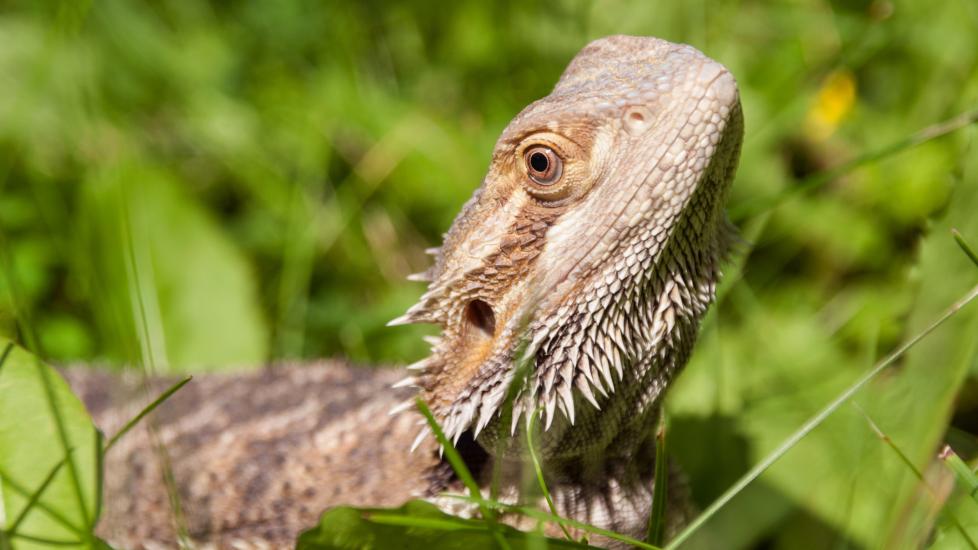Mouth Rot in Bearded Dragons
What Is Mouth Rot in Bearded Dragons?
Mouth rot, also known as infectious stomatitis or periodontal disease, can occur in bearded dragons secondary to bacterial or fungal infections.
Mouth rot often occurs in reptiles, including bearded dragons, that have a specific type of tooth structure called acrodont dentition, where teeth are fused to the jaw and have a very thin gumline. This structure can easily be traumatized, leading to secondary infections in the teeth and the surrounding bone.
Mouth rot is one of the more common diseases veterinarians see in bearded dragons. It is usually not a medical emergency, however if your bearded dragon shows any of the symptoms listed below please see your veterinarian at the earliest time. It’s thought that diet may predispose bearded dragons to this disorder.
Symptoms of Mouth Rot in Bearded Dragons
-
Anorexia (not eating)
-
Swelling at the jaw
-
Inability to close the mouth
-
Red and inflamed gums
-
Bleeding gums
-
Increased mucous from the mouth
-
Abnormal lip line
-
Plaque accumulation
Causes of Mouth Rot in Bearded Dragons
Poor bearded dragon care can lead to a decreased immune system, which keeps the body from clearing bacterial infections. Bearded dragons with immune disorders are especially sensitive to problems with their care.
Mouth rot can also occur following any trauma to the mouth that leads to a wound within the gums. This opens a route of infection to the bone and teeth if not treated correctly or if there are complications when healing.
How Veterinarians Diagnose Mouth Rot in Bearded Dragons
-
Physical examination: A physical performed by a veterinarian with experience with reptiles will help identify any early mouth rot.
-
X-rays: If bearded dragons develop mouth rot, an X-ray allows a veterinarian to see the bones of the jaw and determine if the jaws are affected. If there is mouth rot occurring within the jawbones, additional treatment is needed.
-
Cytology: This allows veterinarians to evaluate what is occurring in mouth rot patients microscopically and aid in identifying the infection.
-
Culture: This test allows for the isolation and identification of both bacterial and fungal organisms that can lead to complications, such as bone infections.
-
Biopsy: A biopsy allows a veterinary pathologist to evaluate the severity of the mouth rot microscopically and asses what microorganisms may be contributing to the disease.
Treatment of Mouth Rot in Bearded Dragons
Feeding hard-bodied insects such as cockroaches, locusts, and grasshoppers, and/or more fibrous vegetables such as pumpkin, leafy greens, and sweet potato can help strengthen the gums and keep the oral cavity clean.
In addition, daily tooth brushing with cotton tipped applicators may be recommended. Dilute chlorhexidine flush can be used for daily tooth brushing or to treat infections topically.
Your veterinarian will also prescribe broad spectrum antibiotics to treat any severe infections from mouth rot that involves the bone. Anti-inflammatory medication can often help control the inflammation and pain associated with mouth rot. In more severe cases, stronger medications such as opioids may be needed. Anti-fungal drugs may be used in rare cases.
Recovery and Management of Mouth Rot in Bearded Dragons
Mouth rot that’s not treated correctly can lead to fractures of the jaw and systemic bacterial or fungal infections. Severe cases in which a bearded dragon may not eat could require a feeding tube or require assisted feeding.
Mouth rot can be prevented by feeding a diverse diet that includes hard-bodied insects and fibrous plant items. Ensuring your bearded dragon has excellent care often can prevent the development of mouth rot.
Mouth Rot in Bearded Dragons FAQs
How do you treat a bearded dragon's mouth sore?
A mouth sore should be evaluated by a veterinarian to determine the severity and the underlying cause. They can make specific recommendations on treatment.
What mouth problems do bearded dragons have?
Bearded dragons can have multiple diseases affect the mouth, these include mouth rot (infectious stomatitis or periodontal disease), metabolic bone disease, cancer, cephalic aneurysm, and the skin around the mouth can show signs of yellow fungus disease.
How do you stop mouth rot?
Prevention with a balanced diverse diet, brushing your dragons’ teeth with instructions from your veterinarian, and regular monitoring of the oral cavity will help prevent mouth rot in bearded dragons.
Why is the inside of my bearded dragon's mouth yellow?
Some bearded dragons have yellow pigmented portions on the inside of their mouth, and this is normal. In mammals, yellowing of the mouth can be a sign of liver disease, but this is not the case in bearded dragons.
Featured Image: pokergecko/E+ via Getty Images Plus
